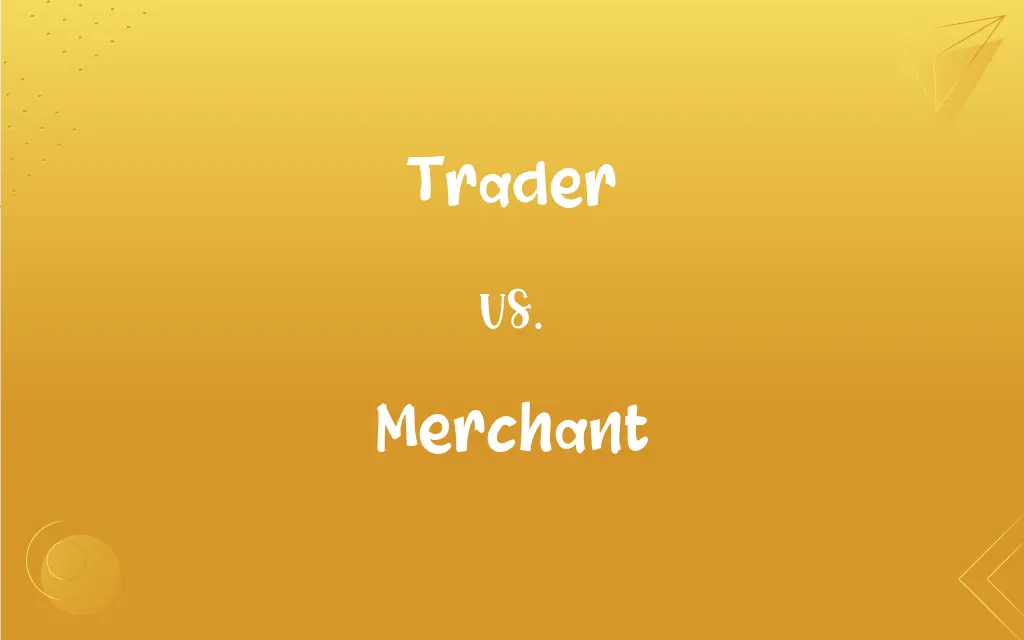Trader vs. Merchant: What's the Difference?
Edited by Harlon Moss || By Janet White || Updated on October 11, 2023
Trader vs. Merchant in less than 2 lines in less than 255 characters: A trader buys and sells goods, often in financial markets, while a merchant deals in commodities and operates within retail or wholesale commerce.

Key Differences
Difference between Trader and Merchant in 4 or 5 standalone paragraphs:
A trader is an individual or entity primarily engaged in the buying and selling of goods, securities, or commodities. They often operate in financial markets, such as stock exchanges or foreign exchange markets. Traders can work for financial institutions, trading firms, or independently, and they typically seek to profit from short-term market fluctuations.
A merchant, on the other hand, is a person or company involved in retail or wholesale trade. This means they purchase goods to sell them to the end consumer or to other businesses. Merchants often have a more direct relationship with consumers and may have physical stores or online platforms where they sell products.
Traders focus on the movement of prices and market dynamics to make profits. They might deal with intangible assets like stocks, bonds, or futures. Their primary goal is often to buy low and sell high or vice versa, depending on the market conditions.
Merchants emphasize the value proposition of the products they offer. They are concerned with inventory management, supply chain operations, and customer relationships. Unlike traders, merchants tend to be more involved in the actual distribution and sale of tangible goods.
ADVERTISEMENT
In summary, while both traders and merchants deal with commodities in one form or another, traders operate within financial markets aiming for short-term profit, while merchants deal directly with goods, focusing on their distribution and sale.
Comparison Chart
Primary Focus
Buying and selling for profit
Retail or wholesale trade of commodities
Typical Operations
Financial markets
Physical or online stores
Goods/Assets
Often intangible (stocks, bonds, futures)
Tangible goods (clothing, electronics)
Relationship
Primarily with markets or other traders
Directly with consumers or other businesses
ADVERTISEMENT
Duration of Holdings
Short-term (can be minutes to months)
Longer-term (until inventory is sold)
Trader and Merchant Definitions
Trader
An individual who buys and sells goods or assets for profit.
As a trader, Jake often studied the stock market to identify profitable opportunities.
Merchant
A person or company engaged in the wholesale or retail sale of goods.
The merchant stocked his store with a variety of local handmade crafts.
Trader
A person involved in trading financial instruments like stocks, bonds, or currencies.
Sarah became a successful forex trader after studying the dynamics of currency exchange.
Merchant
A businessperson known for their integrity in trade dealings.
The community trusted him as an honest merchant who always gave fair prices.
Trader
A professional employed by a financial institution to manage and control trading activities.
The bank hired a new trader to oversee its bond portfolio.
Merchant
One whose occupation is the wholesale purchase and retail sale of goods for profit.
Trader
Someone who operates on short-term market fluctuations.
Being a day trader, Mike bought and sold stocks within a single trading day.
Merchant
One who runs a retail business; a shopkeeper.
Trader
One that trades; a dealer
A gold trader.
A trader in bonds.
Merchant
Of or relating to merchants, merchandise, or commercial trade
A merchant guild.
Trader
One who earns a living by trading goods or securities.
Merchant
The owner or operator of a retail business.
Trader
Someone who purchases and maintains an inventory of goods to be sold
Merchant
One who keeps a store or shop for the sale of goods; a shopkeeper.
Trader
(Nautical) A ship employed in foreign trade.
Merchant
Of, pertaining to, or employed in, trade or merchandise; as, the merchant service.
Trader
One engaged in trade or commerce; one who makes a business of buying and selling or of barter; a merchant; a trafficker; as, a trader to the East Indies; a country trader.
Merchant
A businessperson engaged in retail trade
Trader
A vessel engaged in the coasting or foreign trade.
Merchant
Someone who deals in a specific commodity or commodities.
She was a renowned silk merchant in the town.
Trader
An entity that deals in commodities, especially on a large scale.
Global oil traders closely monitored geopolitical events affecting supply and demand.
Merchant
An individual who operates online or offline stores.
With the rise of e-commerce, he transformed from a traditional merchant to an online one.
Merchant
Of or relating to the merchant marine
Merchant ships.
Merchant
A person who traffics in commodities for profit.
Merchant
A trading vessel; a merchantman.
Merchant
Someone who is noted for a stated type of activity or behaviour.
He's some kind of speed merchant — he drives way too fast.
Goal merchant Smith scored twice again in the match against Mudchester Rovers.
Merchant
(obsolete) A supercargo.
Merchant
As a resident of a region, to buy goods from a non-resident and sell them to another non-resident.
A merchanting service
Merchant
One who traffics on a large scale, especially with foreign countries; a trafficker; a trader.
Others, like merchants, venture trade abroad.
Merchant
A trading vessel; a merchantman.
Merchant
To be a merchant; to trade.
Merchant
A trader who deals directly with end consumers.
As a wine merchant, he curated selections that appealed to both connoisseurs and casual drinkers.
FAQs
What is a trader's primary objective?
A trader's main objective is to buy and sell goods or assets for profit, often through short-term market fluctuations.
What is the focus of a merchant?
A merchant's focus is on the retail or wholesale trade of tangible commodities, often with direct consumer interaction.
Do merchants operate online?
Yes, merchants can operate through physical stores, online platforms, or both.
How do traders manage risks?
Traders often use strategies, analysis, and sometimes hedging instruments to manage potential losses.
How do merchants decide what products to sell?
Merchants often analyze market demand, trends, and their target audience to decide on their product offerings.
Can a trader be a merchant and vice versa?
While they have distinct roles, a person or entity can function as both a trader and a merchant, depending on their business operations.
Do traders only operate in financial markets?
Mostly, but traders can also deal in tangible commodities, while their primary focus remains on buying and selling for profit.
Can traders operate independently?
Yes, traders can work for institutions, trading firms, or operate independently.
What's the difference between a stock trader and a merchant?
A stock trader deals in financial instruments like stocks, while a merchant focuses on tangible goods for retail or wholesale.
What challenges do merchants face?
Merchants deal with challenges like inventory management, supply chain operations, and maintaining customer relationships.
How do traders profit?
Traders profit from market fluctuations, aiming to buy low and sell high or vice versa.
Are the terms "trader" and "merchant" interchangeable?
Not exactly. While both deal with commodities, their roles, operations, and focuses differ.
Can anyone become a merchant?
Yes, anyone can become a merchant, though success often requires understanding market demands and effective business strategies.
How volatile is a trader's income?
A trader's income can be volatile, depending on market conditions and their trading strategies.
Do merchants require a physical presence?
While many merchants have physical stores, the rise of e-commerce allows many to operate solely online.
How has e-commerce influenced merchants?
E-commerce has expanded a merchant's reach globally, making it easier to connect with a wider customer base.
Do merchants typically offer services?
While merchants primarily deal in goods, some also offer related services to enhance their business offerings
How do technological advancements impact traders?
Technology, especially digital platforms and algorithms, has made trading faster and more efficient.
Is trading a profession or a business?
It can be both. Some traders are professionals employed by firms, while others run independent trading businesses.
About Author
Written by
Janet WhiteJanet White has been an esteemed writer and blogger for Difference Wiki. Holding a Master's degree in Science and Medical Journalism from the prestigious Boston University, she has consistently demonstrated her expertise and passion for her field. When she's not immersed in her work, Janet relishes her time exercising, delving into a good book, and cherishing moments with friends and family.
Edited by
Harlon MossHarlon is a seasoned quality moderator and accomplished content writer for Difference Wiki. An alumnus of the prestigious University of California, he earned his degree in Computer Science. Leveraging his academic background, Harlon brings a meticulous and informed perspective to his work, ensuring content accuracy and excellence.
































































